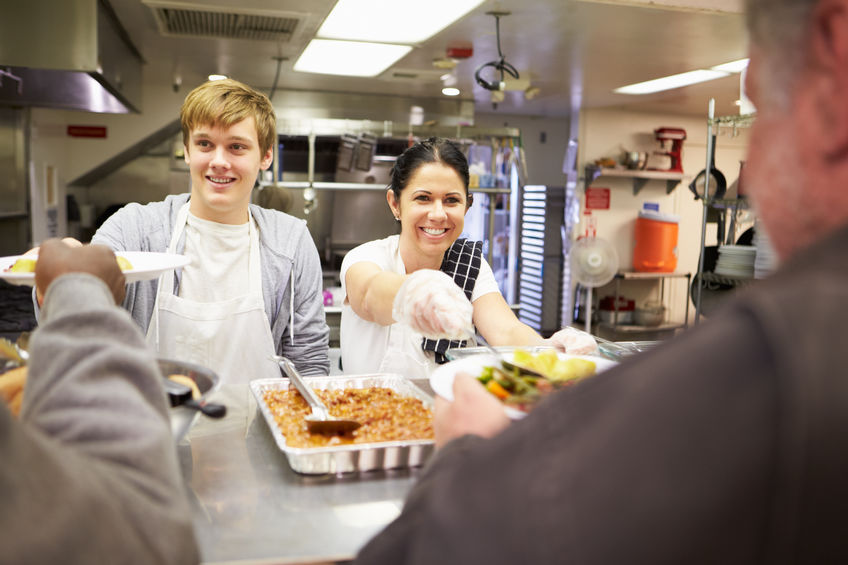When our five-year-old asked for a LEGO set that would equal a car payment I explained he didn’t need it because he already had a lot of LEGO, and that it cost a lot of money. Ever the optimist, he said, “That’s okay, Mom. Just save up for a long time and then get it for me.”
Not quite the response I was hoping for.
Every parent wants to raise grateful kids (or children who at least show gratitude on a regular basis.) It’s the reason you prompt with a sing-song, “What do you say?” as you offer your Little an Arrowroot cookie. What you sincerely hope is that you won’t still be prompting your Bigs when you hand them a burger…or the car keys.
How to Raise Grateful Kids in a Self-Centered World
Grateful people are content with what they already have. But contentment is no small feat in an era of shiny new toys, cool new ‘kicks’ for teens or gadgets for adults (I’m looking at you, iphone11). Contentment is simply refusing to strive and wish for the next thing. (you are enough for me, my sweet iphone5).
So how do we press the reset button on gratitude as a family? Here are a few simple ways to begin.
GO DEEPER
The simple phrase ‘thanks’ can easily lose its meaning and seem like a flat, automatic response. But with a few simple tips, you can teach more impactful ways to say thank you.
For example, every time my mother-in-law pays for groceries, she models genuine appreciation. She makes eye contact with the cashier and says, “Thank you so much for serving me today.” Her sincerity always catches them off-guard in this fast-paced world of “Here’s your receipt” and mumbled thanks.
Teach your children to use this formula to show their gratitude in a mindful way: STOP + LOOK + TALK. Stop (think about what you will say) + Look (make eye contact) + Talk (speak genuinely). These expressions will help your kids be more specific in their gratitude.
- Thanks so much for ______________________
- I really appreciate how you __________________________
- I was very grateful when you ____________________________
Every morning I walk to school with my youngest son. We make it a game to thank our crossing guard in a unique way. Of course we can’t pause in the middle of the road, but we do make eye contact and share specific things we are grateful for. We use phrases like, “We really appreciate you keeping us safe” and “Thanks for being so friendly.”

WRITE IT DOWN
It is easy to model gratitude when life is going your way. A parking spot opens up right in front of the mall. Or a toddler finally potty trains. Or a teenager offers to clear the dishes. But in the midst of zero parking, puddles on the kitchen floor or an eye roll from a teen, it’s easy to lose that grateful feeling.
When my husband was out of work for a year, our faith (and budget) were stretched in many ways. We made a conscious decision as a family to choose gratitude. We began to spot blessings every day and record them in a Blessings Binder. Our blessings included everything from deals on groceries and timely hand-me-down clothes to being gifted with a guest house for a week. Recording these made us all more aware of how much we were thankful for. The best part was hearing our boys say, “Hey Mom, you should write this down in the Blessings Binder.”
Pick up an empty journal to record things you are grateful for as a family. Or create a Gratitude Jar and fill it with slips of paper each family member completes. Open the jar on a special occasion and read through reminders of everyone’s gratitude.
MAKE IT FUN
Character formation doesn’t have to be serious and mundane. Either of these 15-minute ideas will keep gratitude top of mind in a fun way.
Gratitude Scavenger Hunt
When out driving as a family, look around the neighborhood and list 10 people or things you are grateful for. (i.e. garbage men for saving us from smelly streets, policemen for enforcing traffic laws….) End with a doughnut celebration and watch those “Thank you’s” really roll in.
A to Z Thankfulness
Try this during dinner time. List the alphabet on a piece of paper.
For each letter, write things you are grateful for, and the role they play in your lives. Make it an individual competition with older kids, or work as teams with younger ones.
A: air to keep us alive
B: bees that make honey for our toast
C: chocolate for being chocolatey
Offer bonus points for a legitimate answer for Q and X. (seriously, it’s tough to be thankful for quails and xylophones.)
FOSTER DISCUSSION
There will always be natural, teachable moments to discuss becoming grateful. But also carve out time for deeper conversations on the topic. When everyone is home, gather for a Gratitude Gab. Pop popcorn and stay upbeat in spite of any resistance from older kids. Select one or two of these discussion starters:
- Who is the most grateful person you know? What do they do that puts them in this category?
- Share a time when you felt unappreciated. What can you learn from that feeling?
- Is it possible to be grateful even when things don’t go our way?
- Should we really have one day dedicated to Thanksgiving? Shouldn’t we be thankful every day?
- Discuss “Being joyful isn’t what makes you grateful. Being grateful is what makes you joyful.” Ann Voskamp

STEP OUT OF THE BOX
If a lack of gratitude becomes a pattern in your home, it might be time to do something radical as a family. Give your children opportunities to see beyond themselves in practical ways; to stock shelves at a food bank, to chat with people who depend on a warm meal, or simply to garden for an elderly neighbor. In simple acts of service, our gratitude muscles grow. My husband took one of our boys to help serve breakfast in a low-income area. The picture of them donning hair nets, holding mops and grinning ear-to-ear still warms my heart.
Children, especially teenagers, want to be part of something bigger than themselves. On a school trip, our oldest son spent a day handing out sandwiches to homeless men. His teacher called me to say how comfortably he connected with the men. He regretted not packing even more food to give out. He begged her to allow him to join another group doing the same outreach the following day. Our boy came home with a new appreciation of food and shelter, because of his front-row glimpse into poverty.
ELIMINATE ENTITLEMENT
Feeling entitled is a weed that chokes out gratitude. How can we feel genuinely grateful for something when we believe we deserve it?
You may feel badly when you say ‘no’ to something your child asks for especially when they argue that ‘everyone else has one.’ But it is healthy for our kids to understand they can’t have everything they wish for; this helps combat selfishness and entitlement. One of our boys was shocked when his friend’s parents bought him an extra burger at a restaurant. When he told us about it, my oldest gently reminded him, “Remember that was a special treat. Because we have lots of kids, we’re a One Burger Family.” Hearing my son frame this for his brother, encouraged me that children can understand the importance of limits.
But if entitlement begins to creep into your home think of a creative way to push back. Last summer, I began to feel like an on-call Uber driver for my three teenagers. I realized they didn’t understand the time it took to “Hey Mom Can You Drive Me?” often, and without notice.
My boys now need to earn Mom Minutes by helping me before I throw on my chauffeur hat. So for a 15-minute drive they help me with a 30-minute task (there and back, right?). This experiment has worked better than I imagined as they value my time more and I get help on my never-ending to do list. And…if I ever offer to drive them without requiring Mom Minutes, they are extra grateful now. #byebyeentitlement
LEAVE ROOM FOR INDIVIDUAL EXPRESSION
One final caution: don’t assume that less expressive children are less grateful.
Our third son is naturally grateful and exuberant. Whenever he opens a gift, he throws his arms around the gift-giver, listing all the reasons why he loves what they chose. At his eighth birthday party, one Mom said she’d rather buy presents for my boy than her own children because of his fabulous reaction. Quieter children may not show gratitude with such extroverted zeal, but still feel deeply thankful.

MAKE IT STICK
Choose a few activities or discussion starters this week to make gratitude a family focus. And remember that internal heart shifts take time. Don’t be discouraged if it seems that your efforts are not paying off. You never know which moment will spark a child’s transformation. Keep modelling your own gratitude, reminding kids to notice their many blessings and have fun together discovering how to express gratitude in new ways.
Most importantly, in case you haven’t heard the words for a while, thank you for all you do as a parent. Your heart is to raise great kids and I’d slip you a thank you note, if I could.
Pin for later:

TAKE BACK CONTROL OF YOUR HOME LIFE
 Ever feel like you just can't keep up? Our Living Well Starter Guide will show you how to start streamlining your life in just 3 simple steps. It's a game changer--get it free for a limited time!
Ever feel like you just can't keep up? Our Living Well Starter Guide will show you how to start streamlining your life in just 3 simple steps. It's a game changer--get it free for a limited time!
If you love this resource, be sure to check out our digital library of helpful tools and resources for cleaning faster, taking control of your budget, organizing your schedule, and getting food on the table easier than ever before.











Yes, this is not an easy task in our time to raise grateful kids. Parents allow children to do everything they want, so children know that they will be forgiven anyway, no matter what they do. Often they don’t even want to study. I work as a full-time writer and editor at https://ukessay.com/thesis-writing-help and provide help to students. My specialty – writing a college thesis, and it is my favorite type of work. Sometimes you have to do almost all the work for them since they have no motivation to study; it amazed me at first. I always loved to study, and I taught my children that you should not take everything for granted, especially education.